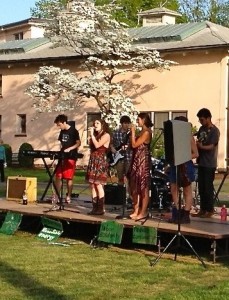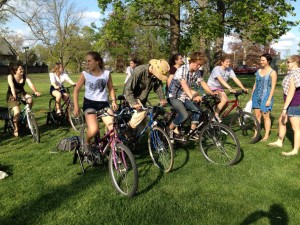As I prepare for my commencement speech this year, I remember vividly when I first realized that I could graduate college in three years rather than four. As a freshman, I was certainly in no hurry to leave. Indeed, I loved being in college: I was excited by the combination of freedom and opportunity to work hard on subjects I loved with faculty I admired. I didn’t want to leave – even for vacations!
But I realized that graduating in three years would save my family lots of money. Neither of my parents had attended college, and they had sacrificed for years to send my brother and me to the schools of our choice. My father was a furrier, and my mother had given up a promising singing career to raise us (while earning money selling clothes in our basement). They were proud that they were able to afford good colleges for us, and they would never have asked me to skip a year.
But I was proud, too, and I wanted to show my father that all the studying I had done had paid off in some way. I had accumulated credits through APs and a summer program, and with a little extra effort I could save almost a year of tuition – over $6,000! I loved my alma mater, but it seemed expensive even in the 1970s, and so I became a sophomore during my first year. The campus offered me countless opportunities, and I ran after them: I was president of my (co-ed) fraternity, published fiction, took music lessons, held down more than one job, and sought to excel in my classes. At the time, I thought that given the fact that I was going to be at school for only three years, I’d better take full advantage of everything there that I could.
Well, I have now been back at my alma mater as its president for five years, and I still find it an amazing place full of opportunities for learning. Recently, I have spoken with the trustees here about measures we can take to make the university more affordable while still ensuring the quality of an education that comes from face-to-face learning with accomplished scholar-teachers. Wesleyan, like many universities, has gotten ever more expensive, and even though we have a robust financial aid program, we know that many families who don’t qualify for large scholarships have great difficulty paying the high tuition we charge. We use these high fees to maintain the quality of our campus and our instruction – and to provide more funds for financial aid.
But in the last year or so, I’ve come to believe that this model is unsustainable. In a new model we are developing we will be committed to spending almost a third of our revenue on scholarships while meeting the financial need of our students without requiring excessive loans. We will also commit to linking tuition increases with inflation, rather than depending on the much higher rates of increase to which Wesleyan (like most colleges and universities) has been accustomed for decades.
We will also make more visible — and provide more support for — the “three year” route that I chose in the mid 1970s. That is, we will help those students who choose to graduate in six semesters (along with some summer work) get the most out of their time on campus. The three-year option isn’t for everyone, but for those students who are prepared to develop their majors a little sooner, shorten their vacations by participating in summer sessions, and take advantage of the wealth of opportunities on campus, this more economical BA might be of genuine interest. In our case, allowing for some summer expenses, families would still save about 20 percent from the total bill for an undergraduate degree. At many private schools that would be around $50,000!
Some have said to me that students think of their undergraduate experience as among the four best years of their lives – so why would they only want three? That’s the question I faced in 1975, and my decision then was that the economic trade-off was worth it. My appreciation for the remarkable experience had at residential liberal arts colleges has only grown since then, but that does not mean that I came to regret my decision. Three marvelous years here were enough to set me squarely on the path of a lifetime of learning.
Again, by no means is the three-year option for everyone. But if we can offer families the same quality undergraduate degree at a significantly reduced total price – and I think we can – why not do it? Our professors will continue to advance their own fields as they mentor young people whose curiosity, idealism and ambition are unleashed. By making this experience a little more accessible, I am betting we will only add to the diversity and quality of the experience for all our undergraduates.
Cross posted from the Washington Post






